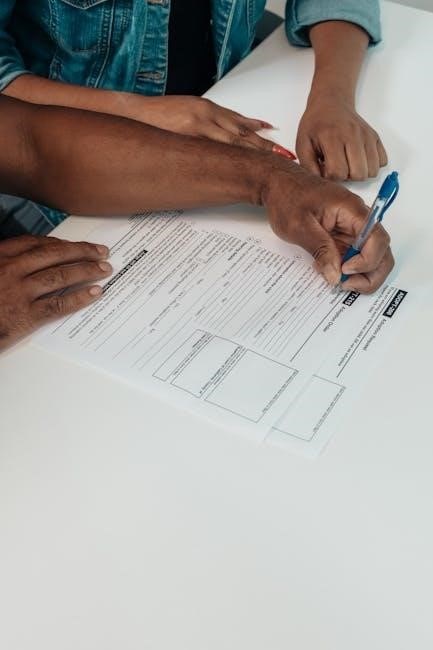The Tenant Rental Application Form BC is a standardized document designed to streamline the rental process for landlords and tenants in British Columbia. It collects essential information, including personal details, rental history, and financial data, to help landlords assess potential tenants. The form ensures compliance with provincial regulations and facilitates fair tenant screening. Its structured format protects both parties by outlining clear expectations and requirements upfront.
1.1 Overview of the Tenant Rental Application Process in BC
The tenant rental application process in BC involves submitting a standardized form to landlords, providing personal, financial, and rental history details. Landlords review applications to assess suitability, often requiring proof of income, references, and consent for credit checks. The process ensures compliance with the Residential Tenancy Act, protecting both parties by outlining clear expectations and legal requirements. It streamlines tenant screening while maintaining fairness and transparency for all involved.
1.2 Importance of the Rental Application Form
The rental application form is crucial for ensuring a fair and transparent tenant selection process in BC. It protects landlords by providing essential information to assess applicants’ reliability and financial stability. Tenants benefit from a standardized process that prevents discrimination and ensures equal consideration. The form also promotes legal compliance, aligning with the Residential Tenancy Act and safeguarding both parties’ rights. Its use fosters trust and clarity, making it indispensable for successful rental agreements.

Key Elements of the Tenant Rental Application Form BC
The form includes personal information, rental history, employment details, and financial data. It also requires references and consent for credit checks, ensuring a comprehensive tenant assessment process.
2.1 Personal Information Required
The application requires full legal names, contact details, and Social Insurance Numbers for all applicants. Additional personal information includes birth dates, emergency contacts, and current address. This data helps landlords verify identities and assess suitability. Applicants must provide accurate information to avoid delays or rejections. The form also includes sections for spouses, dependents, and other occupants, ensuring all household members are accounted for in the tenancy agreement.
2.2 Rental History and References
The application requires applicants to provide a detailed rental history, including names and contact information of previous landlords. This section helps landlords in assessing the applicant’s reliability and responsibility as a tenant. Additionally, applicants must list at least two personal references, which are used to verify credibility and suitability for the rental property.
2.3 Financial and Employment Information
The application requires proof of income, such as pay stubs or bank statements, to assess the applicant’s ability to pay rent. Employment details, including job title, employer, and length of employment, are also mandatory. This section helps landlords evaluate financial stability and ensures tenants can meet rental obligations. Additional documentation, like tax returns, may be requested to verify income and employment status.
2.4 Consent for Credit and Background Checks
The application requires applicants to consent to credit and background checks. This allows landlords to assess financial reliability and rental history. The form includes authorization for verifying employment and creditworthiness. Applicants must agree to these checks, ensuring landlords can make informed decisions. The consent is a standard step in evaluating potential tenants and is required for a fair and transparent screening process.

Understanding the Application Process
The application process involves submitting a completed form with required documents, such as proof of income and rental history. Landlords review applications to assess suitability. The process ensures fairness and transparency, with clear steps for both tenants and landlords. Understanding each stage helps applicants prepare thoroughly and landlords evaluate potential tenants effectively while adhering to legal standards and best practices in tenant screening.
3.1 How to Fill Out the Application Form
To complete the BC rental application form, start by selecting the type of rental accommodation. Provide accurate personal and financial details, including employment history and rental references. Attach required documents like pay stubs, bank statements, and photo ID. Ensure all sections are filled honestly and thoroughly to avoid delays. Submit the form online or in person, depending on the landlord’s preference. Double-check for errors before finalizing.
3.2 Required Supporting Documents
When submitting a rental application in BC, applicants must provide specific supporting documents. These include proof of income (e.g., recent pay stubs, bank statements), photo ID (e.g., driver’s license or passport), and rental history (e.g., references from previous landlords). Additional documents may include employment letters and credit reports. Accurate and complete documentation ensures a smooth application process and helps landlords assess suitability for tenancy.
3.4 Submitting the Application
Once completed, the application can be submitted online, in-person, or via email/fax, depending on the landlord’s preference. Ensure all required documents are attached. Landlords typically verify the information and may contact references. Applicants should retain a copy of the submitted application for their records. Timely submission increases the chances of securing the rental property. Confirm receipt with the landlord to ensure proper processing.

Legal Requirements and Compliance
The Tenant Rental Application Form BC must comply with the Residential Tenancy Act (RTA) and related regulations. Landlords must avoid prohibited questions and ensure the form does not discriminate. Proper consent for credit checks and clear disclosure of tenant rights are mandatory. Compliance ensures a fair and legal rental process for both parties in British Columbia.
4.1 Residential Tenancy Act (RTA) in BC
The Residential Tenancy Act (RTA) governs landlord-tenant relationships in British Columbia, ensuring fairness and transparency. Key aspects include rent increases, eviction rules, and tenant rights. The RTA prohibits landlords from asking discriminatory questions on rental applications. Non-compliance can lead to legal disputes. Tenants are protected against unlawful evictions, while landlords must follow specific procedures for rent increases and terminations. Understanding the RTA is crucial for both parties to navigate the rental process effectively.
4.2 Landlord and Tenant Rights and Responsibilities
The Residential Tenancy Act (RTA) outlines clear rights and responsibilities for both landlords and tenants in BC. Landlords must maintain the property, ensure habitability, and provide proper notice for rent increases or evictions. Tenants are responsible for paying rent, maintaining the unit, and adhering to lease terms. Both parties must respect each other’s rights, with landlords avoiding unlawful entry and tenants refraining from unauthorized changes. Understanding these roles is essential for a harmonious rental relationship.
4.3 Prohibited Questions on Rental Applications
Landlords in BC are legally prohibited from asking certain questions on rental applications to prevent discrimination. Questions about race, gender, marital status, disability, or citizenship are strictly forbidden. Additionally, inquiries about a tenant’s age, family status, or source of income (e.g., government assistance) are also prohibited under human rights laws. This ensures the rental process remains fair and non-discriminatory, protecting applicants’ rights while maintaining landlord compliance.

Additional Forms and Resources
Landlords and tenants in BC can access various forms, such as RTB-7 for rent increases and RTB-52 for additional rent increase applications. Other resources, like the Residential Tenancy Branch (RTB) and Tenant Resource and Advisory Centre (TRAC), provide guidance and support for rental-related matters.
5.1 RTB-7: Notice of Rent Increase
The RTB-7 form is mandatory for landlords in BC to notify tenants of rent increases. It must be completed accurately and served at least three months before the effective date. Landlords cannot exceed the allowable annual increase without approval. Failure to use this form or comply with requirements may result in penalties. Tenants can dispute unfair increases through the Residential Tenancy Branch.
5.2 RTB-52: Application for Additional Rent Increase
The RTB-52 form allows landlords to request rent increases beyond the annual allowable limit. It must be submitted to the Residential Tenancy Branch for approval. Landlords must provide justification for the increase, such as significant property improvements or operating cost hikes. Tenants receive notice of the application, and an arbitrator reviews the case. This form ensures transparency and fairness in rent adjustment disputes, balancing landlord and tenant interests.
5.3 Other Relevant Forms for Landlords and Tenants
Beyond the RTB-7 and RTB-52, landlords and tenants in BC may encounter other essential forms. The Residential Tenancy Agreement is mandatory for leases, outlining terms like rent, duration, and responsibilities. Inspection Reports document property condition, protecting both parties. Dispute Resolution Forms are used for mediation or arbitration. These documents ensure clarity, compliance, and fairness in tenancy matters, safeguarding the rights of all involved.

Special Considerations
Special considerations include rental application fees, processing times, and handling rejections. Fees may apply for credit checks, while processing times vary by landlord. Rejections must be communicated clearly.
6.1 Rental Application Fees
Rental application fees in BC typically cover costs like credit checks and administrative tasks. Fees are usually non-refundable and range between $20 to $100. Landlords must disclose fee details upfront, ensuring transparency. Tenants should review policies before paying, as some landlords may waive fees. BC regulations cap fees to prevent exploitation, balancing fairness for both tenants and landlords in the application process.
6.2 Processing Time and Decision Notifications
The processing time for rental applications in BC typically ranges from a few days to a week, depending on the landlord’s workload and the complexity of the application. Landlords are required to notify tenants in writing of their decision, whether approved or rejected. This ensures transparency and accountability. Tenants should follow up if they haven’t received a decision within a reasonable timeframe, as delays can impact housing plans.
6.3 Handling Rejections and Disputes
If a rental application is rejected, tenants may seek clarification from the landlord. Disputes can arise over rejection reasons or application processes. In such cases, tenants can contact the Residential Tenancy Branch for guidance or mediation. Professional communication and understanding of legal rights are crucial to resolving conflicts fairly. Tenants should document all interactions to support their case if further action is required.

Digital and Online Application Options
Digital platforms like RentCafe and Zego offer online rental applications, enabling tenants to apply conveniently. Electronic submission streamlines the process, reducing paperwork and enhancing security.
7.1 Online Rental Application Platforms
Online platforms like RentCafe and Zego simplify the rental process by allowing tenants to submit applications digitally. These platforms offer streamlined interfaces for uploading documents, reducing paperwork, and expediting approvals. Tenants can easily fill out forms, attach required documents, and track their application status in real time. Landlords benefit from efficient screening tools and faster processing times. Additionally, online platforms enhance security and privacy, ensuring sensitive information is protected. This modern approach makes renting more accessible and convenient for all parties involved.
7.2 Benefits of Electronic Submission
Electronic submission of rental applications offers numerous advantages, including improved efficiency and reduced processing times. Tenants can apply from anywhere, at any time, with instant document uploads. Automated systems minimize errors and ensure completeness; Landlords benefit from streamlined screening and faster decision-making. Additionally, digital records provide enhanced security and easier access for future reference. This modern approach saves time and reduces the hassle of traditional paperwork for all parties involved.
7.3 Security and Privacy Concerns
Electronic rental applications raise important security and privacy concerns. Sensitive personal and financial data must be protected from breaches. Reputable platforms use encryption and secure servers to safeguard information. Tenants should verify that platforms comply with BC privacy laws. Landlords must also ensure data confidentiality when handling digital applications. Clear privacy policies and consent forms are essential to maintain trust and prevent unauthorized access to applicant information.

COVID-19 Relief Measures and Rental Applications
The COVID-19 pandemic prompted relief measures such as the Temporary Rental Supplement Program and Emergency Benefit for Workers, impacting rental applications and tenant financial assessments significantly.
8.1 Temporary Rental Supplement Program
The Temporary Rental Supplement Program was introduced to support tenants facing financial hardship due to COVID-19. It provided direct payments to landlords, covering a portion of rent for eligible households. This initiative aimed to prevent evictions and stabilize housing during the pandemic. Tenants could apply through the BC government’s emergency relief measures, ensuring timely assistance and maintaining housing security. The program streamlined rental applications during this challenging period.
8.2 Emergency Benefit for Workers
The BC Emergency Benefit for Workers provided a one-time $1,000 payment to support tenants struggling with rent due to COVID-19. This benefit helped individuals facing financial hardship, ensuring they could meet their rental obligations. Tenants could apply for this assistance to avoid eviction, offering temporary relief during the pandemic. The program was part of broader measures to stabilize housing and support vulnerable renters in British Columbia.
8.3 Impact on Rental Applications During the Pandemic
The COVID-19 pandemic significantly impacted rental applications in BC, with increased demand for assistance programs like the Temporary Rental Supplement. Tenants faced financial hardships, prompting landlords to seek alternative solutions. The Emergency Benefit for Workers provided temporary relief, helping tenants meet rent obligations. This period also saw shifts in tenant-landlord dynamics, emphasizing the need for flexible solutions to maintain housing stability during unprecedented times.

Resources for Tenants and Landlords
Key resources include the Residential Tenancy Branch (RTB) and the Tenant Resource and Advisory Centre (TRAC), which provide guidance, legal advice, and support for both tenants and landlords in BC.
9.1 Residential Tenancy Branch (RTB)
The Residential Tenancy Branch (RTB) is a vital resource for both tenants and landlords in British Columbia. It provides essential services, including dispute resolution, rental form downloads, and guidance on tenancy laws. Landlords can access forms like RTB-7 for rent increases and RTB-52 for additional rent applications. Tenants benefit from resources that protect their rights, such as rental agreement templates and information on legal protections. The RTB ensures fair practices by enforcing the Residential Tenancy Act, offering mediation for conflicts, and educating both parties on their responsibilities. Visit their official website for comprehensive support and up-to-date information on rental applications and tenancy-related matters;
9.2 Tenant Resource and Advisory Centre (TRAC)
The Tenant Resource and Advisory Centre (TRAC) is a trusted resource for tenants in British Columbia. It provides free legal advice, educational workshops, and advocacy services to help tenants understand their rights. TRAC assists with issues like evictions, rent increases, and disputes with landlords. Their resources include guides on rental applications, tenancy agreements, and dispute resolution. TRAC empowers tenants by offering practical tools and support to navigate the rental market confidently and protect their interests under the Residential Tenancy Act.
9.3 Local Housing Authorities and Support
Local housing authorities in British Columbia provide crucial support for tenants and landlords navigating rental applications. Organizations like BC Housing and municipal housing departments offer resources to guide applicants through the process. They assist with understanding tenancy agreements, rent supplements, and dispute resolution. These agencies also help tenants access affordable housing programs and provide referrals to legal aid when needed. Their support ensures a fair and transparent rental application process for all parties involved.

Future Considerations and Updates
The future of tenant rental applications in BC may include streamlined digital processes and updated legal requirements to enhance transparency and fairness for all parties involved.
10.1 Upcoming Changes to Rental Laws in BC
BC is expected to introduce stricter rent control measures and enhanced tenant protections. Changes may include caps on rent increases and stronger penalties for illegal evictions. The province is also exploring reforms to streamline dispute resolution processes and improve transparency in rental applications. Additionally, there is a focus on expanding tenant rights regarding renovations and demolitions, ensuring more equitable housing outcomes for renters across British Columbia.
10.2 Emerging Trends in Rental Applications
Digital tools and online platforms are transforming rental applications in BC, offering streamlined processes and faster approvals. Landlords increasingly use AI-driven tenant screening services to assess applicants. Virtual property tours and digital document submission are becoming standard. Additionally, blockchain technology is emerging for secure rental agreements. These innovations aim to enhance efficiency, transparency, and accessibility for both landlords and tenants in the rental application process.
10.3 Advocacy for Tenant Rights
Advocacy for tenant rights in BC focuses on ensuring fair treatment and legal protections for renters. Organizations like the Tenant Resource and Advisory Centre (TRAC) provide legal support and education to tenants. Efforts are underway to strengthen rent control policies, prevent unlawful evictions, and improve housing affordability. Advocates also push for clearer guidelines on rental applications to reduce discrimination and ensure transparency in the tenant selection process.
The Tenant Rental Application Form BC is a crucial document for both landlords and tenants, ensuring a fair and transparent rental process. It streamlines tenant screening, protects legal rights, and adheres to provincial regulations. By understanding and utilizing this form effectively, all parties can navigate the rental market with confidence. Continued advocacy for tenant rights and updates to rental laws will further enhance its role in fostering equitable housing solutions in British Columbia.

No Responses